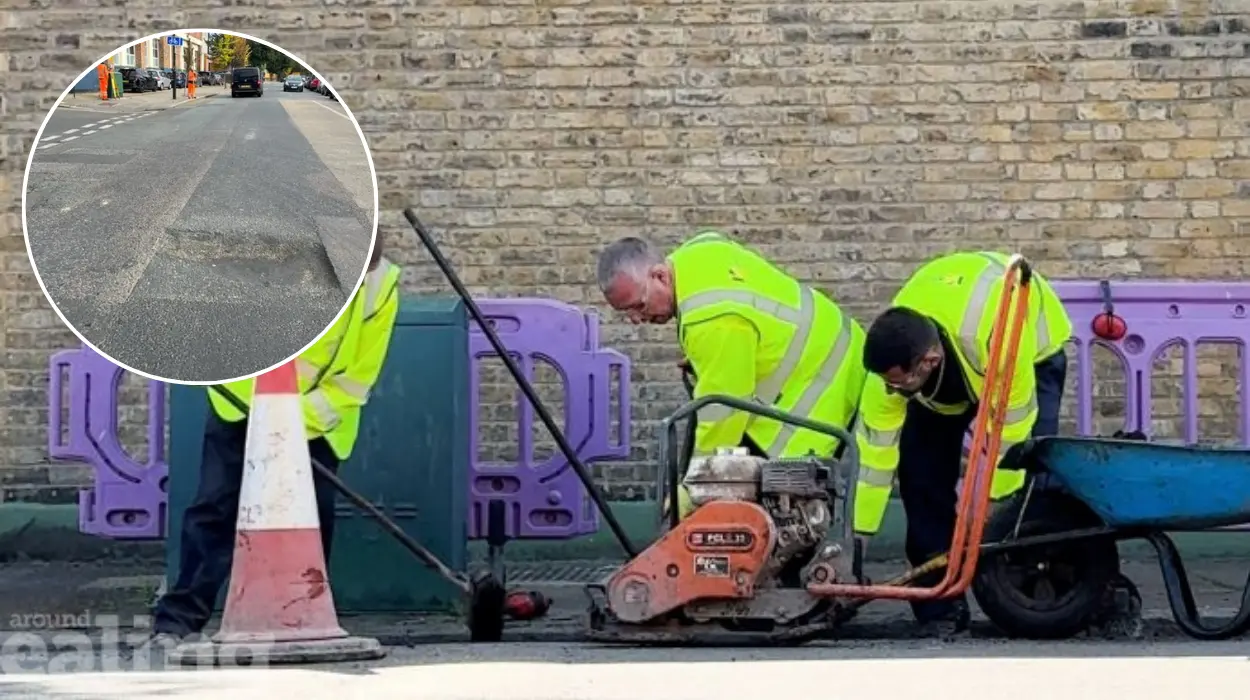Ealing (Parliament Politics Magazine) – More than 50 pothole damage claims have been filed against Ealing Council since 2022, but only a few led to compensation, Freedom of Information data shows.
The FOI response showed that overall council spending on pothole repairs in the borough decreased from £502,886 in 2023/24 to £302,889 in 2024/25, despite the fact that few claims resulted in compensation being awarded.
Between 2022–2023 and 2024–2025, the Labour-run council received 55 pothole-related claims, according to data obtained by EALING.NEWS from Personal Injury Claims UK.
Ten claims were filed in 2022, twenty-four in 2023, and twenty-one in 2024. Only a small percentage of these claims were successful, according to the FOI answer, with compensation payouts totaling £424 in 2022, £142 in 2023, and none in 2024.
When water seeps into gaps in the road’s surface and expands during cold temperatures, it weakens the tarmac and causes potholes. Experts claim that aging asphalt, inadequate drainage, and damage from utility construction exacerbate the issue.
Speaking to EALING.NEWS, Ealing Liberal Democrat leader Councillor Gary Malcolm, said:
“Liberal Democrats say that if it is a top council priority then why are so many streets left with potholes for so long. Potholes affect all form of transport whether it be cars, cycles and buses so the Liberal Democrats say that Labour-run Ealing Council need to be better at preventing potholes and fixing the more serious ones quicker.”
According to the FOI answer, there were 26 unrepaired potholes in the borough as of August 15, 2025, all of which had been recorded that month and were still within the council’s 30-day repair window. Eight flaws were discovered on Carlton Road, which had the largest number. Greenford Road, Lady Margaret Road, Ruislip Road East, Gurnell Grove, and Whitton Avenue West were among the other impacted places.
The figures come amid growing concern over the state of the UK’s roads. It is believed that there are more than one million potholes nationally, which remain among the primary causes of car breakdowns. The government has pledged £1.6 billion to repair local roads by the end of 2026, though motoring organisations have warned that the funding will not be enough to address the backlog.
The RAC estimates there are around six potholes per mile on local roads in England and Wales. It stated it attended 25,758 pothole-related breakdowns in the 12 months to September 2025, an 11% increase on the previous year, averaging 71 callouts a day.
Speaking to EALING.NEWS, an Ealing Council spokesperson said:
“Maintaining and improving the borough’s road network is one of our top priorities and staff have been working hard to keep our roads safe, reliable and fit for purpose.
Over the last two years we have repaired more than 7,250 potholes that is an average of 10 potholes every day.
Ealing Council proactively maintains its roads using advanced data systems to work more efficiently and carry out long-term repairs. We have delivered more than 14km in 2023 and 10.5km in 2024 of preventative maintenance, resurfacing and structural maintenance, and introduced sustainable materials and techniques for longer-lasting repairs.
In addition, in May, Ealing Council was given its biggest ever funding boost by the government – £945,000 – to tackle the borough’s pothole problem. Half the money is being spent on a new ‘drive and repair’ programme, which includes daily patrols that will fix potholes immediately. The other half is being used to supplement resurfacing works on key roads including the Lido Junction in West Ealing and the A40/Argyle Road junction in Perivale.”
What reasons did the council give for rejecting most claims?
The unforeseen road deterioration or third- party conduct, claims may be denied, If the council can demonstrate that the damage was due to circumstances outside their control.
These reasons align with typical council and insurer norms to insure only valid claims backed by acceptable substantiation and provable council fault result in payouts. This process protects public finances and encourages form and reporting rather than unverified or fraudulent claims.
The fairly low number of payouts compared to claims reflects a rigorous legal and examination process designed to balance responsibility with practical conservation challenges. This approach ensures finances are targeted effectively to maintain the city’s roads and reduces fraudulent or unsubstantiated claims.


